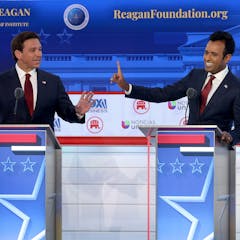
Articles on US presidency
Displaying 1 - 20 of 38 articles

On the 100th anniversary of Woodrow Wilson’s death, a presidential historian looks at how he was able to stay in power despite his illnesses.

With Donald Trump absent again, Republican presidential hopefuls took potshots at each other but agreed that Bidenomics isn’t cutting it.

A former executive director of the National Governors Association explains what it is about certain governors that makes them less suited for the presidency.

Pence’s announcement that he will run for president brings to mind how rare it is for a vice president to compete against a former running mate.

Compromises, no matter how horrible, have long been used to solve seemingly intractable political problems – but at a cost.

The US constitution would not restrict Donald Trump from running for president, even if he is in the middle of a court case, or was convicted.

Biden can seem like a relic from a different age. But he also represents tradition, a form of politics that is not trapped in constant, partisan trench warfare on every issue.

A House panel made four criminal referrals in relation to Donald Trump’s alleged role in the attack on the Capitol. Convictions might make him an unpalatable candidate but wouldn’t bar him from running.

There’s a high bar for a federal judge to grant a search warrant, indicating there is probable cause that Trump committed a crime by holding classified documents at Mar-a-Lago.

All presidents must deposit transcriptions of their public statements with the National Archives. But in the case of Donald Trump, there’s something missing.

Diaries, visitor logs, handwritten notes and speech drafts are among the records Donald Trump has tried to keep from a Congressional committee investigating the Capitol riot of Jan. 6.

An already bitterly divided public has reacted badly to the US withdrawal from Afghanistan and Biden’s handling of the COVID crisis.

Donald Trump asked his former presidential aides not to testify before a congressional committee investigating the Jan. 6 Capitol insurrection – testing the limits of congressional oversight.

Only one president has done so – Franklin Delano Roosevelt – but others considered it, and even tried.

While democracy requires accountability from presidents, presidents may lose stature, not gain it, by holding a press conference.

When presidents have tried to address pressing issues through executive action, members of Congress are quick to ask the courts to step in.

For decades, presidents routinely replaced large swaths of the government workforce, often requiring them to pay fees to political parties in exchange for their jobs.

St. Matthew is the patron saint of civil servants – making the Washington, D.C., church bearing his name a fitting venue for presidents, both past and present.

Joe Biden’s presidential campaign and his inauguration mark an important change for the roughly 3 million people in the United States who stutter.

The term can be traced back to the Founding Fathers.
